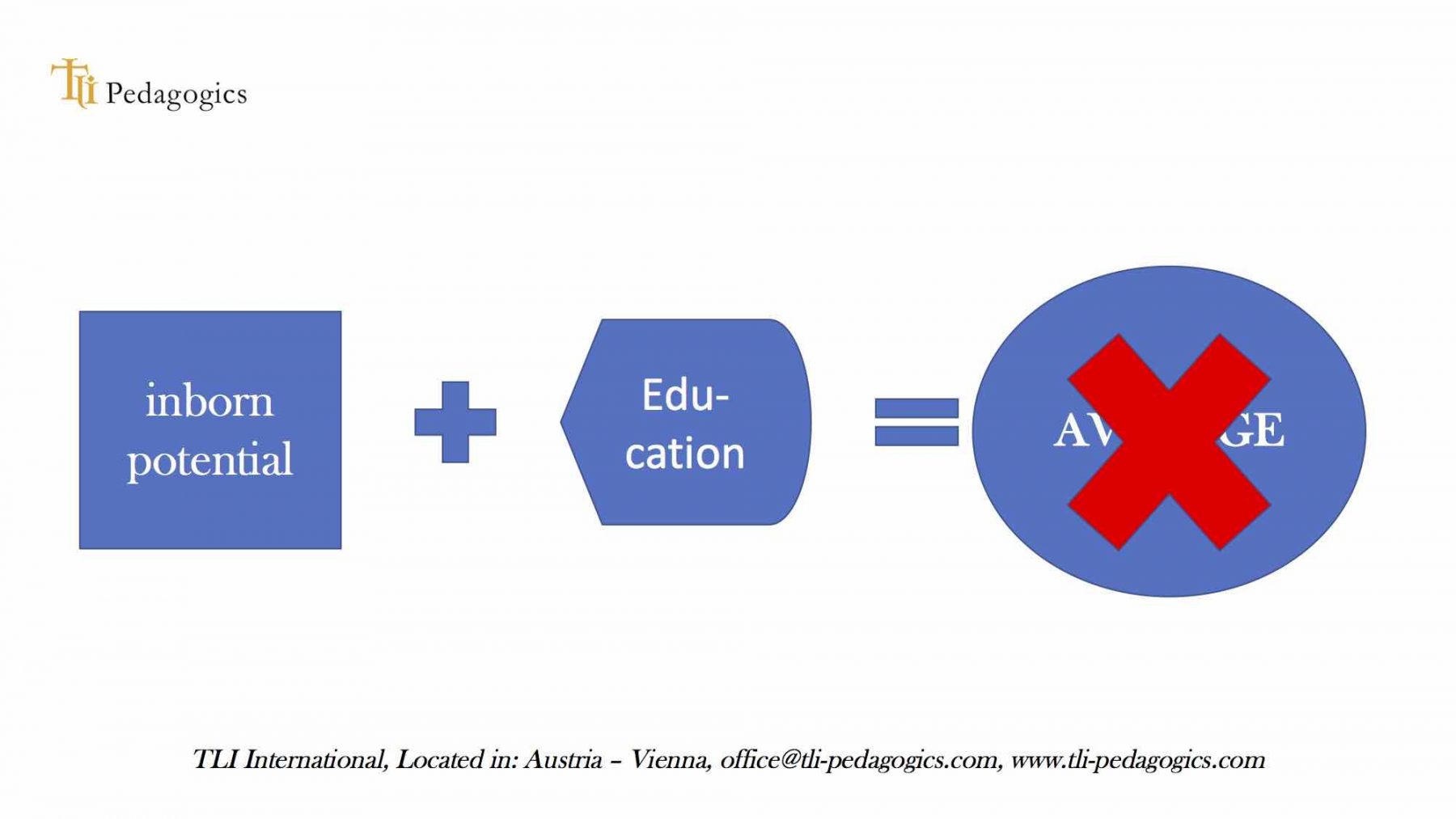Last week, I gave an Introductory talk on TLI Pedagogics in Delhi, India. It was an amazing event with very engaging and interested teachers and parents. During my talk I used a slide:
The first slide states: Inborn potential + Education = Average
The next slide states the same but then: crossed off the word “average”.
It seems that these two slides caused some misunderstanding therefore, I would like to collaborate on the thought behind those two slides.
We know, that children are born with an endless amount of potential. For example, they hold 100 billion neurons in their brain, while an adult brain has only half of this amount. Nature creates in a newborn a situation, that the brain can adjust to any situation. Let’s say we have an Indian baby which then is placed in a German family – the baby will adjust to the memes*, language, and habits of the German family. The same is true in the opposite direction. If we would take a german baby, born by a german mother and given to an Indian family, the newborn would adjust do the Indian memes, eating habits, language and whatever. This simply means that the potential, which drowses deep inside of each infant is unmeasurable and seemingly unlimited.
What role does education play in this development?
One of the roles education plays in the development of a child is to either unfold the most of this potential hidden inside and allow it to grow or to simply make the child an “average” person by standardizing processes. In this part parents, teachers and the educational skills used will influence the outcome to a high degree. Education by parents and educational institutions shape the child’s future.
What does this exactly mean?
Let me give you an example of academic outcomes:
If your child attends a school, where a standardized lecture is given to all children in the classroom at the same time, the potential of the children will be touched differently. For some, it might be too difficult. For others, it might be too easy. In both cases, the potential of each child cannot unfold completely. The child who finds the task too easy will have limited stimulation in the brain, therefore, it will not engage completely. The result from the viewpoint of what its brain could achieve – will be “average”. The other child, who finds the topic too complex or difficult will only remember a limited amount of information. If the same task would be taught according to its way of understanding, the speed it can follow as well as the number of repetitions which are needed – the child could acquire more knowledge than through the offered way of learning. In this case, the child’s potential also will not be unfolded and education will create and an average person.
This is one example, how education helps a child’s potential to unfold or limits it to become an average student.
This example can now be brought into practice on the development of emotional as well as social intelligence. Personalized teaching, therefore is a tool we will have to look more and more during these next years. TLI Pedagogics uses personalized teaching a lot.
What worked for the last 150 years, worked for society during the industrial age. Now, we are moving into a new age, which makes different ways of learning possible and available as we understand so much more. 20 or 30 years back we did not have the same understanding of human development and we did not have the same tools available as of today. Education by parents and educational institutions is what shapes the child’s way of understanding the world and life. Now, we can upgrade to the modern style of education. I put lots of energy and thought into spreading the word that we need intelligent education, that encourages children to live in these unstable and flexible times. With the right tools on hand, they will be able to live successfully and face the challenges which are coming. If we stick to the old methodologies and systems, we will not support the children’s growth.
TLI Pedagogics was developed over a period of 17 years, including empiric research, the study of hundreds of different research articles (including neuroscience, modern psychology, attachment psychology, artificial intelligence, social intelligence, environmental responsibility) as well as collaboration with many modern educational concepts. I believe, that we should turn our focus toward personalized teaching or even more toward the guidance of the potential of each child along its path of growing up.




